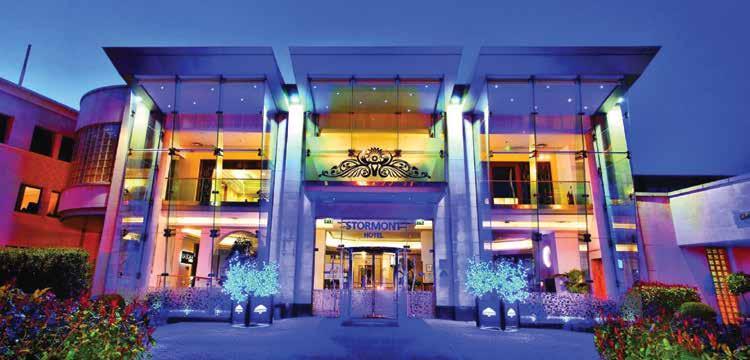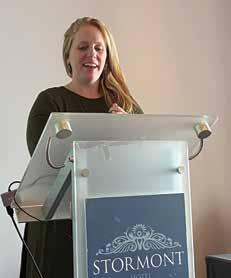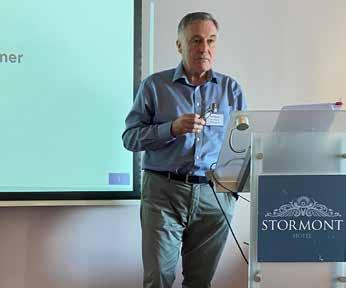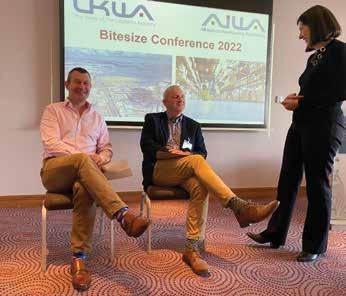
5 minute read
WAREHOUSINg
UKWA Belfast Warehousing Showcase explores closer links between Ireland & GB
Barriers created by Brexit along with changes in supply chains and storage strategy are driving Irish companies to consider warehousing options across Britain, according to a report produced by Model Logistics in collaboration with the UK Warehousing Association (UKWA).
CLAIRE BOTTLE
This was the timely context for the UKWA Warehousing Showcase seminar held at the Stormont Hotel in Belfast, where Irish delegates heard from Paul Johnson of Model Logistics about the benefits of holding stock closer to customers and the different options available to them.
The event opened with Jarlath Sweeney, Group Editor, Fleet Publications, who welcomed UKWA CEO Clare Bottle and the prospect of closer ties between UKWA and businesses in Ireland. He outlined the history of the formation of the All Ireland Warehousing Association eleven years ago: “The AIWA was established to encompass companies in Northern Ireland and the Republic of Ireland that provide warehousing and other logistics support services in the supply chain. The Association is directly affiliated to UKWA and over the years we have helped out to relay enquiries back to London through our website warehousingireland.ie,” he said. Simon McKeever, CEO, Irish Exporters Association spoke about the increasing importance of sustainability as a strategic priority but said that the warehousing and logistics industry was ‘behind the curve’. “Sustainability encompasses human rights and a decent working environment as well clean, affordable energy and a commitment to addressing climate change,” he explained. “While economic, social and environmental considerations are key to a sustainable framework for businesses, the challenge is to find the balance between the three.”
Simon said that drivers for change include climate change, consumer demand, the need for legal compliance, pressure from investors, suppliers and employees, as well as brand reputation. He added that research indicates that consumers are prepared to pay between 2-10% more for services or goods from ethical companies with prominent ESG (Environmental, Social & Corporate Governance) credentials. With that, he announced the imminent launch of the Institute of Sustainable Trade, a new initiative by the Irish Exporters


RUTH EDWARDS


SIMON MCKEEVER
Association to support Irish businesses on their journey to sustainability.
Ruth Edwards, Operations Director at Talent in Logistics shared her latest research on Employee Engagement, first presented at UKWA’s National Conference in March. She alluded to an aging population, Brexit and poor industry image as barriers to recruitment, with 54% of logistics businesses expecting to see severe worker and skills shortages by 2024.
Her research, undertaken with UKMHA, surveyed attitudes of 11,000 forklift operators in an attempt to understand what attracted workers to an employer and what motivated them to stay. “People create business value – so employee engagement is a massive differentiator in times of change and is essential to future talent pipelines,” she said.
Respondents confirmed that while pay was important, it was by no means the only factor in attracting and retaining employees. The survey showed that diversity and inclusion, trusted managers, and a better work/life balance were all more highly valued than a 5% pay rise. Training in particular was viewed as vital by younger workers, with 94% wanting to progress their careers. Ruth concluded: “The cost of recruitment, onboarding and training is high – between £10-30K, depending on job function – so that engaging with employees, ensuring they feel valued, included and motivated simply makes sense!”
Following Paul Johnson’s presentation of Enterprise Ireland’s report on the options for Irish businesses to find warehousing in Great Britain, the event closed with a Q&A session focusing on property issues in Ireland with experts Nigel Healy of JLL and Frazer Hood of McConnells.
Topics ranged from land values (significantly less in Northern Ireland than in the Republic or Britain) and the impact on size of buildings and rental values, to frustration with planning and ‘land banking’ by big companies, which is pushing prices up. Nigel observed that developers must ‘tick the ESG box’ in order to attract funding, and have a tenant as well as an investor lined up before proceeding, otherwise construction costs go up. Frazer noted that in the North, the planning process was particularly slow moving and routinely took 12 months to two years. Shortage of labour and the importance of proximity to power were seen as challenges common to Ireland and Britain, along with extraordinarily low vacancy rates – currently 2-3%. There is a degree of speculative build, they said, with Nigel remarking that there are more ‘big box’ projects underway than he’d seen throughout his career.
The discussion ended with a look to the future, and acknowledgement that costs of solar power and EV are coming down. Frazer said that EPV charging points were to be set up across Northern Ireland. Both envisaged building styles changing to accommodate flexible working, with bigger social spaces and higher quality working environments.
Nigel concluded, “The economy is
stable and people over here are problem solvers – we are set fair to go forward. We need to understand what occupiers really want, and we thank UKWA for creating an environment where stakeholders can have these conversations.”
Commenting on the event, Clare Bottle said, “This is our first event in Ireland, and we will certainly be back again next year. It was great to hear perspectives from a different part of the UK, with everyone enjoying discussions around the different challenges and opportunities, as well as networking with industry colleagues. I’d like to thank Jarlath for the warm welcome we received, and our expert speakers for enabling us to share their knowledge and experience, helping foster closer links with our colleagues in Ireland.”
PANEL DISCUSSION - NIGEL HEALY & FRAZER HOOD WITH CLAIRE Text: Jarlath Sweeney – Photos: Megan Dunmore - DDPR


